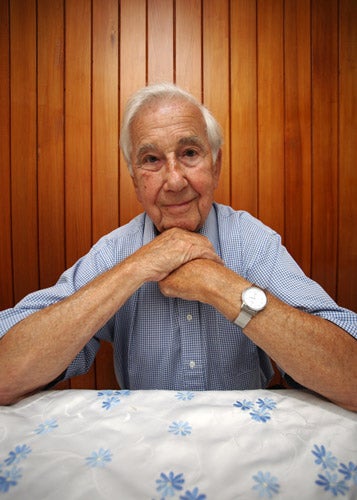First person: 'I survived Dachau and fought at D-Day'
Willy Field, 89

Saying goodbye to my family at the train station in Bonn in 1939, I already had the feeling I would never see them again. A year earlier, in November 1938 – five years after Adolf Hitler became German chancellor – I'd first realised something terrible was happening in my country. One morning, I'd been walking to the factory where I worked, 10 kilometres outside my town, and saw Jewish shops being burned and looted; our local synagogue was also in flames, but the fire brigade were doing nothing to put it out. At work, a group of Gestapo came for me. I asked them why I was being arrested and they said: "You are Jewish, we cannot have you around now."
The Gestapo took me to a high security prison. I was only 18 years old at the time, and as they closed this heavy door behind them I thought to myself: "God forbid – what have I done?" For five days I was kept in a cell. Then, in the middle of the night, I and many other Jews were put on a train; we didn't know where we were going, but when we arrived at the camp two or three days later, there was a big sign that said: "Arbeit macht frei" (or "Work Makes [One] Free"). Then I knew. I had already heard that such camps existed, for holding homosexuals and communists, and I had heard of this sign.
It was a terribly cold winter that year. Everyone at the camp was undressed, had their hair shaved off and was given a number. Then we were hosed with ice-cold water and beaten up. After a month I was allowed to send a small postcard to my family. I said I was being well looked after and that all was OK. At this point, my brother and father hadn't yet been taken away and my parents, after many months, managed to obtain an agricultural work permit for me to leave the camp and flee to any country that would have me. I was very lucky; months later, I was out of there.
I spent four weeks at home in Bonn when I left the camp, before having to leave for England where I was given a job on a farm in Devon. I spoke no English and arrived with 10 shillings and a tiny suitcase. The man on the farm was very kind but I had to move to another farm where I was very badly treated. The man there considered me to be a German.
As part of my job, every morning I would milk the cows and take an urn of milk to the main street for a man in a horse and cart to collect. That was how I made my getaway. The cart driver agreed to take me to the nearest village, and I escaped back to London where I got a job in the East End, making uniforms for the British Army. I was very happy there. But in 1940, as the war got worse, all the refugees were interned. The police took me to a camp with 300 others and we were sent to Australia. We were treated like prisoners of war on the way; we weren't allowed on deck of the ship and I had no idea where we were being taken. Eight weeks later, we arrived.
In Australia we were held in a big camp and treated very well, but when we were offered the chance to volunteer to go back to England and join the Army, I wanted to go, to be involved in getting rid of that terrible regime. As soon as we got on the ship, we were sworn into the British Army; we were no longer refugees. In the UK, I reported to the Pioneer Corps in Devon where I finally fulfilled my ambition to become a tank driver. At last I was a real British soldier in a real British uniform, and soon I was preparing for the D-Day landing.
As I drove my tank on to the beach I felt I'd finally been given the chance to do the right thing. A long time afterwards, I found out that all my family had been killed in the camps back in Germany. When I look back at my life I feel like a very lucky person. This country has changed my life. If I hadn't come here, I would have perished like my family.
Read Willy's story in Helen Fry's 'From Dachau to D-Day: The Refugee Who Fought for Britain', published by The History Press, £20
Subscribe to Independent Premium to bookmark this article
Want to bookmark your favourite articles and stories to read or reference later? Start your Independent Premium subscription today.

Join our commenting forum
Join thought-provoking conversations, follow other Independent readers and see their replies